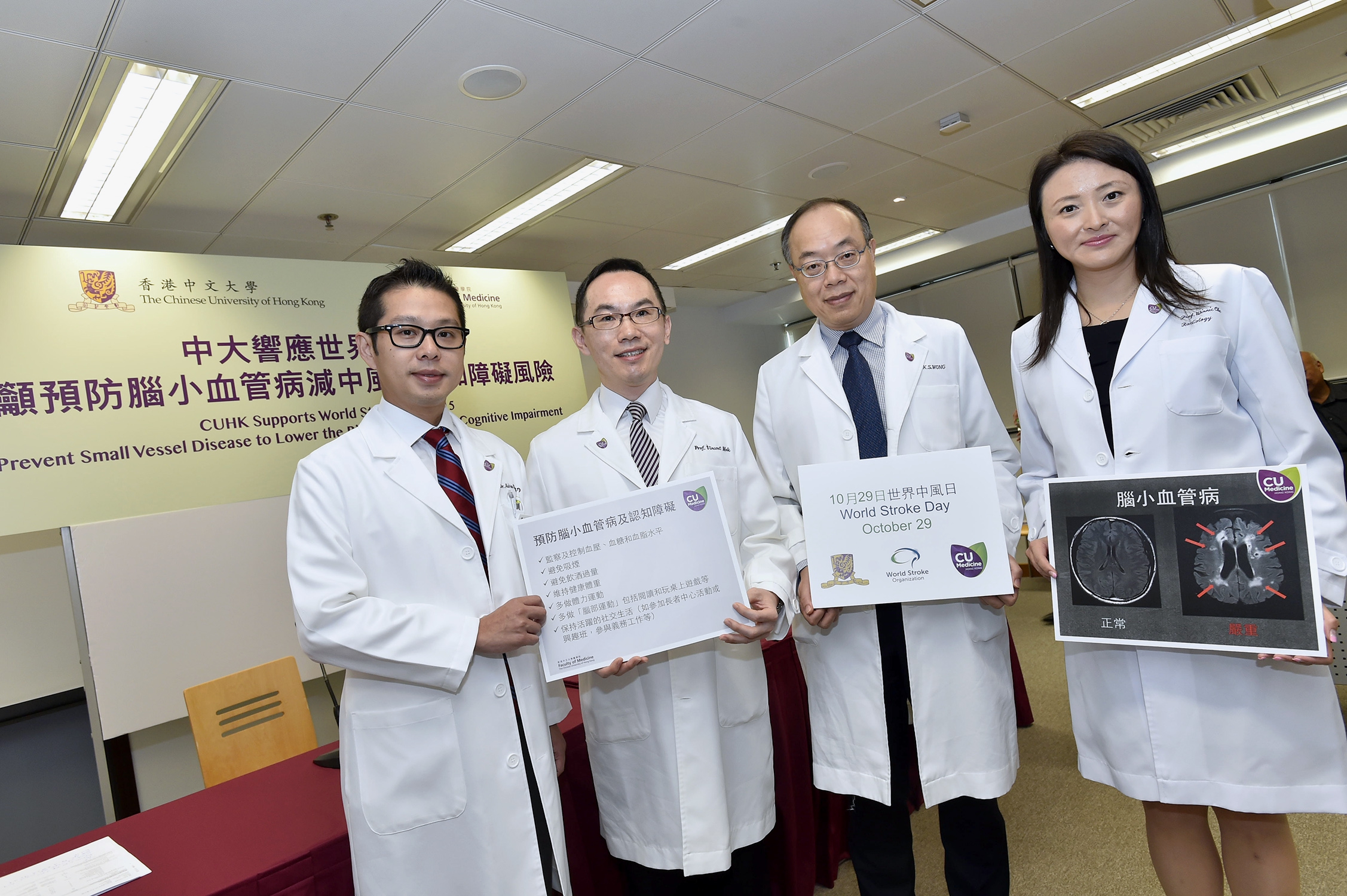CUHK
News Centre
CUHK Screening Reveals 1 in 3 Older Adults in CommunitySuffer Brain Small Vessel Disease Early Prevention Recommended
The Department of Medicine and Therapeutics at The Chinese University of Hong Kong (CUHK) has conducted a screening programme between 2012 and 2015, which reveals that one-third of 800 older adults aged 65 or above in the community suffer from moderate to severe brain small vessel disease (SVD). Among the severe SVD patients, those with minor strokes will have a 3.4 times higher risk of developing dementia over 3 years. Speaking on the World Stroke Day, Prof. Lawrence K.S. Wong, Mok Hing Yiu Professor of Medicine, Head of Division of Neurology, Department of Medicine and Therapeutics at CUHK and the Secretary of the World Stroke Organization, remarked that CUHK would like to encourage Hong Kong citizens to control vascular risk factors to prevent dementia and stroke.
SVD can lead to dementia
Dementia is a syndrome associated with a decline in cognition. According to the Hong Kong Population Projections released by the Census and Statistics Department in 2015, the proportion of elderly population (>65) will increase from 15% (1.1 million) to 36% (3.3 million) in 50 years. As society is rapidly ageing, dementia cases are expected to increase in the coming decades from 99,000 to 297,000. The majority of dementia cases among the elderly are thought to be related to Alzheimer’s disease, a degenerative disease affecting the brain.
The research team led by Prof. Vincent C.T. Mok, Division of Neurology, Department of Medicine and Therapeutics at CUHK, is one of the leading teams in the world that discovered that brain small vessel disease can lead to stroke and cognitive impairment of varying severity.
The results of the screening programme conducted by the research team showed that 29% of the 800 participating older adults in the community had severe brain SVD. The subjects of the screening programme are all without history of stroke or dementia. Professor Mok remarked, ‘In fact, many subjects who have brain SVD do not have strokes, yet they may suffer progressive cognitive decline. In another study of minor stroke patients, those harboring severe SVD have a 3.4 times higher risk of developing dementia over 3 years. The latter findings have been recently reported in the International Society of Vascular Behavioural and Cognitive Disorders (Vas-Cog) Conference in Tokyo. Other related research findings of our team over the years have been published in prestigious journals including Alzheimer’s & Dementia and Stroke.’
Symptoms of SVD and imaging diagnosis
Dr. Adrian Wong, Research Assistant Professor and Clinical Psychologist at the Division of Neurology, Department of Medicine and Therapeutics at CUHK, stated, ‘Cognitive impairment associated with SVD is initially characterized by slower thinking and executive functions impairment such as difficulties in planning or performing complex tasks, a pattern that is different from that in Alzheimer’s disease in which memory loss was the most prominent feature. In addition, people with SVD are more likely to have low mood and tend to lose interests to do things they previously enjoyed.’ Brain SVD may have no symptoms, but as it progresses, cognitive impairment, depression, gait disturbance and urinary incontinence may be induced. If the disease further advances, patients may even develop strokes. Therefore, early identification of SVD related symptoms in older adults is important so that further examination can be carried out.
Brain SVD can be detected by brain imaging, better detected by MRI over CT. Prof. Winnie C.W. Chu, Department of Imaging & Interventional Radiology at CUHK, further explained that on MRI, SVD is depicted as either small black holes (i.e. lacunes) or diffuse ‘white patches’ (i.e. white matter hyperintensities). The research team has also worked with computer engineers to develop an automatic system to quantify the severity of SVD on MRI, which will be available for clinical use in near future.
Prevention and treatment of SVD
Studies conducted by CUHK and other international groups showed that people with high blood pressure, blood sugar and lipids level as well as smoking habits have higher risks of SVD. Older adults who suffer a decline in cognition while having the above risk factors should seek medical advice to see whether there is a need for further examination for SVD. The public should also proactively prevent stroke and dementia associated with brain SVD by enhancing vascular and cognitive health with integrated healthy lifestyle including the following:
- Monitor and control blood pressure, blood sugar and lipid levels
- Stop smoking
- Maintain a healthy weight
- Reduce excessive alcohol consumption
- Do physical exercises and mental activities like reading, using computer or playing games (such as board games) regularly
- Maintain an active social life (e.g. joining elderly centres or interest classes and participating in volunteer work, etc.)
Prof. Vincent Mok added that some people, even with good control of vascular risk factors and use of conventional medications, continue to have progression of SVD and associated cognitive decline. More research is thus needed to explore treatments for SVD. Currently the research team is exploring a newer anti-platelet agent for the treatment of SVD in people without dementia or stroke. The team is also planning to initiate another trial on physical exercise and on Chinese herbs in improving cognition, mood and balance in people with SVD.
(From right) Prof Winnie Chiu-wing CHU, Department of Imaging & Interventional Radiology; Prof Lawrence Ka-sing WONG, Professor Vincent Chung-tong MOK and Dr. Adrian WONG of the Division of Neurology, Department of Medicine and Therapeutics, present findings of a recent screening programme on brain small vessel disease.







